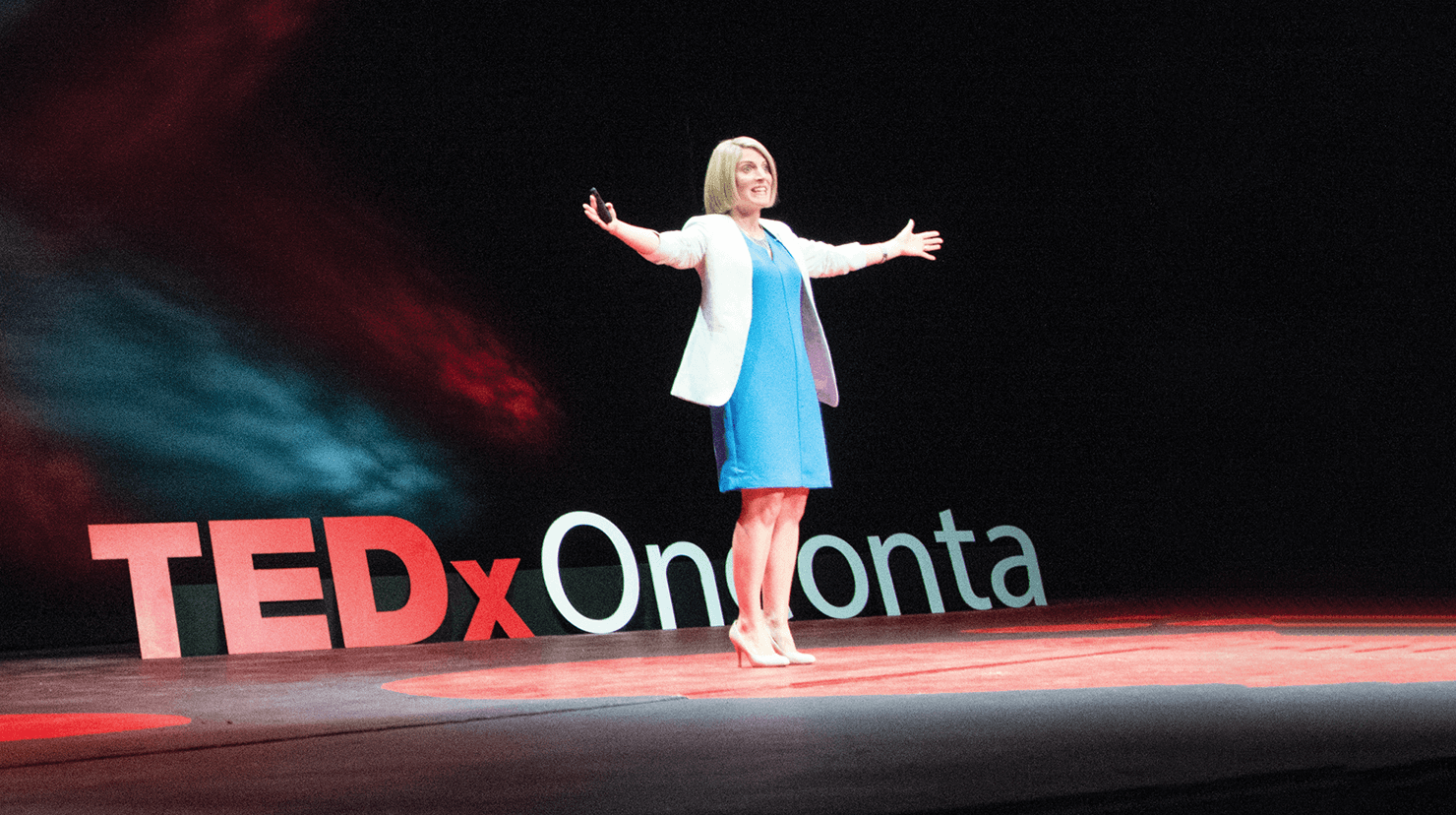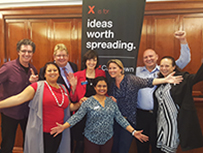"How can I become a TEDx speaker?” This is a question I hear often, ever since I started organizing TEDx events in Poland. After TED launched the independently organized TEDx events all around the world in 2009, speaking on the “red dot” has become the dream of many. Speakers, authors, and presenters see the stage time at TEDx as a possibility to reach broader audiences; it’s both a distinction and a great opportunity for promotion.
But it takes more than just being a confident speaker to get to the TEDx stage. Organizers have specific ideas in mind when they curate a TEDx event. To get deeper insight into the process, Toastmasters members and District leaders who are involved in organizing TEDx events share their experiences.
Finding “Ideas Worth Spreading”
The motto of all TED events is “Ideas Worth Spreading.” When organizers begin to plan the event, they don’t start with speakers—they start with the ideas they want to spread in their local communities. Usually, TEDx events feature a diversity of speakers across several disciplines who address a variety of topics.
Cristina Juesas, DTM, an organizer of TEDxVitoriaGasteiz in Spain, says she looks for ideas that are truly adding something new in terms of scientific discoveries and challenges, with ideas never told before and different points of view on common topics. Norberto Amaral, DTM, an organizer of TEDxPorto in Portugal, says, “We always look for ideas and projects that can have the greatest impact and relevance for the community. It’s also important to reference what we are not looking for: life coaches, simple inspirational and motivational messages, linear life stories, and unfounded opinions.” Alberto Escobar, DTM, a TEDx organizer in Mexico, looks for genuine ideas that impact attendees. “I always seek to change something in our society; I am looking for ideas that change the world,” he says.
You may be surprised to learn that professional speakers are specifically not recommended for the TEDx stage for several reasons. They usually already have their platforms to share ideas, have probably shared this idea to different audiences before, and can speak about anything. Having confidence in speaking in public is not enough to get to a TEDx stage—you need to have a new, interesting, and factual idea worth spreading. Do you have one? Then the next part is for you.
Pitching Your Idea
When presenting your idea to TEDx organizers, it is important to be clear about the goal and main message you want to deliver, and how it benefits the local community. A TED Talk topic has three main criteria:
- It is a new idea, not previously shared with another audience.
- It is factual, based on evidence.
- It will be interesting to a broad audience.
If you’re considering pitching a TED idea, here are some do’s and don’ts when presenting yourself and your topic.
What NOT to say:
- I am a professional speaker/trainer/coach.
- I have delivered this talk to a different audience and they loved it.
- I can speak about anything! What do you want me to speak about?
- I would like to recommend my boss—he is an amazing speaker!
What to say:
- This idea will add value to your event because ...
- This idea is innovative because ...
- I am competent to speak about it because …
- The idea is interesting to our local community because ...
“It’s important to know the TEDx event you apply for,” says Norberto Amaral, the TEDx organizer in Portugal. He recommends familiarizing yourself with the theme of the particular event you are applying to and the kind of talks given previously. In light of this, he says, “Write a short proposal about your idea and why it matters. Make sure you explain why you are the right person to do a talk about this subject.” He cautions against sending the same message to different TEDx organizers.
As a TEDx organizer, I agree with Norberto. Let me share that many of us know each other, and we share information: For example, speaker candidates who are more interested in self-promotion rather than sharing ideas worth spreading go on the blacklist.
Considering International Venues
As a result of an overwhelming amount of applications, TEDx organizers have to choose among the best ideas. What if your idea was rejected from your local TEDx event? Don’t worry. Ask for feedback. Find out why it was not suitable for this specific event and ask if it would be reasonable to apply next year. Cristina Juesas, the TEDx organizer in Spain, says that it is always worth asking for the cause of rejection. Maybe your idea is not as worthy of spreading as you think it may be. And the organizers can help you to improve it.
Most of the TEDx events are focused on local communities; however, it is also possible to apply for an event outside your geographic area. The events I organized in Poland included speakers from Sweden, the U.K., Canada, and Germany, all of whom had ideas relevant for our local audience. Just keep in mind that TEDx events are nonprofit and often don’t have a budget to cover expenses of speakers traveling from afar.
“We have brought foreign speakers and only covered travel expenses to the event,” says Alberto Escobar, organizer of TEDxBarriodelaEstacion. “Many of them are honored to be invited to give a talk, so it is common for them to accept some costs.”
Helping You Prepare
So you have a great idea, you apply for your local TEDx event, and you get accepted as a speaker—what’s next? How do you prepare to deliver your perfect TEDx Talk? The event organizers will help you with that! During the last TEDxWarsawWomen event I organized in Poland, we started the speakers’ preparation process five months before the event.
Preparation included individual meetings with speakers and several workshops on everything from the TED Talk structure to voice projection and stage presence. All speakers had mentors assigned to support them with speech preparation during the process. Before the event we had two rehearsals, first to see the final version of the speech and make last-minute adjustments, and then a dress rehearsal with lighting and a microphone to make speakers comfortable with the stage. It takes a lot of time and effort to prepare a truly impactful TEDx Talk, but it really makes a difference.
What is the difference between the TEDx and Toastmasters speaking styles? In both settings there are no specific requirements in terms of delivery. However, crucial differences are worth highlighting.
Toastmasters |
TEDx |
|
|
Timing |
5-7 min. (in most cases) |
3-18 min |
|
Goal of speech |
Depending on the project, the goal can be to inform, inspire, entertain, etc. |
Persuasive speech. The goal is to make people adopt your idea. |
|
Audience |
Limited to a club or conference participants (in most cases). |
Not limited to event participants. TEDx Talks can get millions of views globally. |
|
Body language |
Speakers are encouraged to move purposefully on stage when speaking. |
Speakers are not encouraged to move on stage. This is mainly for the recording and post-production purposes. |
|
Visual aids |
Using slides is not encouraged, unless required by the project. |
Using slides can be helpful in explaining complex ideas. |
In Toastmasters we practice how to be confident presenters; therefore, good delivery often can be a goal itself. On the TEDx stage, however, delivery is the tool to get your message through. All TED Talks focus on the content—a well-crafted message, simple structure, good arguments supported by evidence.
I have seen a lot of amazing speakers with ideas worth spreading. The TEDx stage is a great platform to share ideas with the broad audience. If you have a new, interesting, and research-based idea that has the potential to change the world, challenge yourself and don’t be afraid to apply for your local TEDx event.
Elena Paweta, DTM is a District 108 leader (Poland, Finland, Latvia, Lithuania, Estonia) and a member of Poland's First Toastmasters in Warsaw, Poland. She is a Dale Carnegie trainer and an academic lecturer holding her Ph.D. in economics.
Related Articles

Personal Growth
How I Prepared for 18 Make-or-Break Minutes

Club Experience




 WANT TO GO BEHIND THE SCENES? BECOME A TEDx VOLUNTEER
WANT TO GO BEHIND THE SCENES? BECOME A TEDx VOLUNTEER
